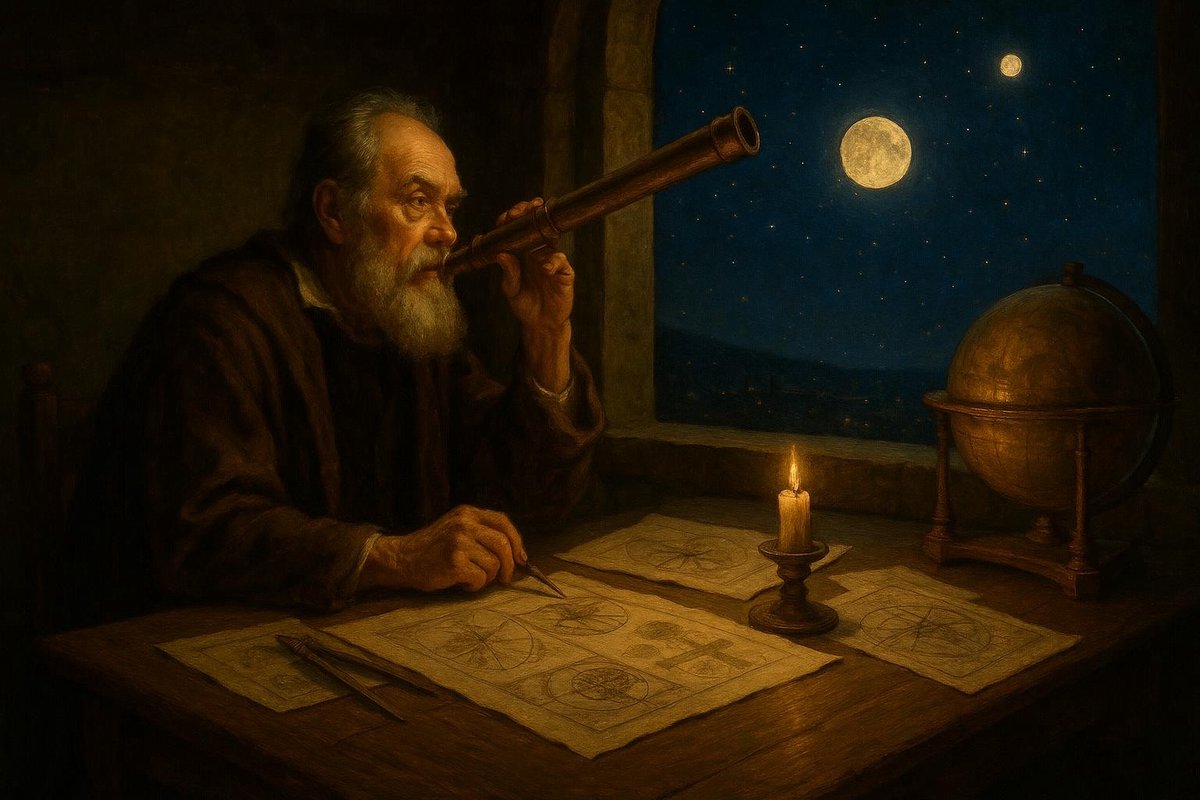
Imagine a time when the universe was little more than a glittering ceiling over a flat Earth, with stars as mere adornments in the night sky. This was the world before Galileo Galilei lifted his telescope towards the heavens. With the simple yet groundbreaking act of pointing a lens skyward, Galileo did more than just observe celestial bodies — he invited us to reconsider our very place in the cosmos. His curiosity was the engine of revolution, shifting our view from a geocentric to a heliocentric universe and igniting the scientific revolution.
The Birth of a New Vision in Astronomy
Galileo’s telescope was not the first ever created, but it was the first used to scrutinize the skies in such depth. Interestingly, his fascination with the lens, a tool so mundane yet magical, opened a portal into realms unseen.
- Galileo improved upon existing designs, magnifying celestial objects up to 20 times.
- He was the first to observe Jupiter’s moons, proving not all celestial bodies orbited Earth.
- His observations of the phases of Venus supported the Copernican heliocentric model.
These breakthroughs were not merely technical; they were deeply philosophical. By challenging the prevailing Ptolemaic system, Galileo set the stage for the modern understanding of our solar system. Imagine the shockwaves his findings sent through a society anchored in religious and traditional beliefs, much like the stir caused by Einstein’s relativity centuries later.
The Science of Seeing
No wonder Galileo is often dubbed the father of modern observational astronomy. His telescope was a scientific instrument, but it was also a tool for seeing differently — a lens of curiosity, if you will.
- Through it, Galileo witnessed the rugged terrain of the Moon, challenging the belief in celestial perfection.
- He documented sunspots, further disputing the idea of immutable skies.
- His sketches and notes laid the groundwork for empirical scientific methods.
Galileo’s approach was akin to an artist discovering a new color palette. He didn’t just look at the heavens; he saw them, questioned them, and documented them, creating a new narrative of our universe. This curiosity-driven exploration is reminiscent of the artistic breakthroughs of the Renaissance, where perspective and realism transformed visual art.
Galileo’s Impact on Scientific Thought
Many people believe that the true impact of Galileo’s work lies in the shift it initiated in scientific thought. Of course, his findings were revolutionary at the time, but their greatest legacy was the change in how knowledge was pursued and validated.
- His insistence on empirical evidence laid the groundwork for the scientific method.
- He encouraged a mindset that valued observation over philosophical speculation.
- His work inspired generations of scientists to question and explore the unknown.
Galileo’s methodology was a precursor to the Enlightenment, fostering an intellectual atmosphere where inquiry and evidence became the bedrock of scientific exploration. It’s fascinating to consider how his lens of curiosity not only reshaped astronomy but also influenced disciplines as diverse as biology, physics, and even philosophy.
Legacy of the Lens: Beyond Astronomy
As time goes on, the implications of Galileo’s telescope extend far beyond the stars. His work sparked a lineage of curiosity that continues to challenge and inspire today.
- His telescopic discoveries encouraged technological advancements in optics and instrumentation.
- His approach to inquiry influenced the way we approach scientific challenges across disciplines.
- His legacy lives on in modern space exploration and our ongoing quest to understand our universe.
Consider the Hubble Telescope — a direct descendant of Galileo’s lens, gazing deeper into the cosmos than ever imagined. The spirit of curiosity that Galileo exemplified continues to drive our exploration of the universe, urging us to ask the perennial question: What else lies beyond?
In conclusion, Galileo’s telescope was more than an instrument; it was a catalyst for a profound transformation in perception. By daring to look beyond and question established beliefs, he reshaped our understanding of the universe and our place within it.
Fuel Someone Else’s Curiosity
If you found this journey through Galileo’s transformative lens as enlightening as we hope you did, why not share it? Encourage others to peer through the telescopes of their minds. Let’s spread the spark of curiosity far and wide, igniting new passions and discoveries.

Leave a Reply